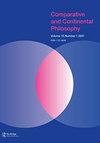Redeemed From Skepticism Nietzsche’s Revaluation of Inquiry (ζητϵῖν) and Tranquility (ἀταραξία) in Pyrrhonian Skeptics
IF 0.3
0 PHILOSOPHY
引用次数: 0
Abstract
ABSTRACT Friedrich Nietzsche offers different opinions of the ancient Skeptics. On certain occasions, he praises them as philosophers of intellectual integrity, because they constantly question dogma and continue to inquire (ζητϵῖν) into the truth. He insists, however, that it is indispensable for every individual to adopt her own perspective in specific conditions, rather than suspend judgment as the Skeptics do. On other occasions, Nietzsche criticizes the ancient Skeptics because they separate their academic investigations from their philosophy of life and only comply with conventions or apparent phenomena observed through sensations. Furthermore, he ridicules their ultimate goal – tranquility of mind (ἀταραξία) – as a product of feeble exhaustion. He himself is ready to embrace torments of life as part of the will to power. Although some similarities can be traced between Nietzsche and the ancient Skeptics, Nietzsche is more consistent in connecting his theoretical investigation and his philosophy as a way of life.从怀疑论中救赎尼采对探究的重估ῖν) 和宁静(ἀταραξία)
摘要弗里德里希·尼采对古代怀疑论者提出了不同的观点。在某些场合,他称赞他们是知识完整的哲学家,因为他们不断质疑教条并继续探究(ζητõῖν) 了解真相。然而,他坚持认为,每个人在特定条件下都必须采用自己的观点,而不是像怀疑论者那样暂停判断。在其他场合,尼采批评古代怀疑论者,因为他们将学术研究与生活哲学分开,只遵循通过感觉观察到的惯例或明显现象。此外,他还嘲笑他们的终极目标——心灵的宁静(ἀταραξία)作为微弱衰竭的产物。作为权力意志的一部分,他自己已经准备好接受生活的折磨。尽管尼采和古代怀疑论者之间有一些相似之处,但尼采在将他的理论研究与他的哲学作为一种生活方式联系起来方面更为一致。
本文章由计算机程序翻译,如有差异,请以英文原文为准。
求助全文
约1分钟内获得全文
求助全文

 求助内容:
求助内容: 应助结果提醒方式:
应助结果提醒方式:


